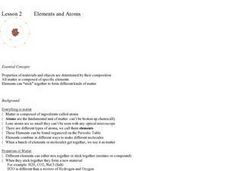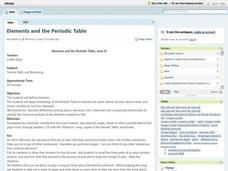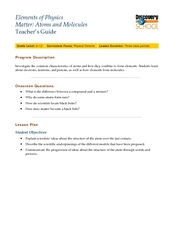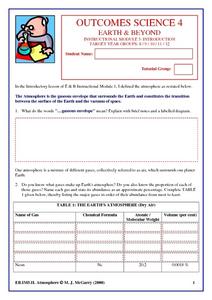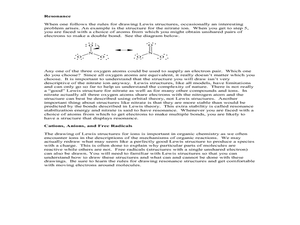Aquarium of the Pacific
Lego Molecules
Young scientists construct an understanding of molecular compounds in this hands-on science lesson. Using LEGO® to model the atoms of different elements, learners build molecules based on the chemical formulas of common compounds.
Chymist
Empirical Formula of a Compound
Because of the work of John Dalton, we are able to write formulas for compounds. The hands-on experiment has scholars prepare a compound from its elements. Using mass data, individuals write the empirical formula for the compound.
Curated OER
The Elements
Fifth graders explore the differences between elements. In this elements and atoms lesson students complete an activity that shows how chemicals react to a flame test.
Perkins School for the Blind
Building an Organic Molecule
Glucose is a simple sugar and a molecule that can be illustrated through modeling. Scientific investigators with visual impairments use hands-on models to reconstruct the process of bonding molecules. The tools used in this activity are...
Curated OER
Elements And Atoms
Students investigate the concept of elements and atoms. They conduct research using a variety of resources and use the information in order to create a class presentation. The instructional activity includes specific dialogue and steps...
Curated OER
Making Molecules
In this making molecules worksheet, students complete a table of elements with their symbol, atomic number, atomic mass, number of protons, number of electrons, period and group. Students then make models using pipe cleaners and beads of...
Curated OER
Elements and the Periodic Table
Students are introduced to the elements on the Periodic Table and what is meant by element. Using the Table, they identify the name, atomic mass, number and symbol of each element. To end the instructional activity, they discover the...
Massachusetts Institute of Technology
Lego Atoms and Molecules: Chemical Reactions
Show young chemists what a chemical reaction looks like with two parts of a hands-on experiment. First, learners conduct a wet lab where they observe the reactants (baking soda and calcium chloride, with phenolsulfonphthalein)...
Beyond Benign
Cookie Equations
Cookies and chemical equations have a lot in common! Using cookies as a reference, scholars learn to balance chemical equations. Pieces of the cookies represent different parts of the compounds and elements. This is the sixth installment...
Curated OER
Differentiate Elements, Compounds, and Mixtures
Pupils examine the differences between elements, compounds and mixtures. Using diagrams, they compare and contrast atoms and molecules and describe various chemical reactions. They distinguish the differences between ionic and covalent...
Curated OER
Worksheet 2-2 Stoichiometric Tools
In this stoichiometry worksheet, students solve a variety of problems including finding empirical and molecular formulas, determining molarities of solutions, determining molecular weights of compounds and calculating the percent mass of...
Curated OER
Chemistry Unit on Compounds, Formulas, and Equations
Students perform a review assignment in 3 portions to review chemistry compounds, formulas, and equations. The assignment consists of several different portions that can be used as assessments. The majority of the lesson plan is composed...
Curated OER
Different Minerals
In this minerals worksheet, students read about the relationship between elements, rocks and minerals. They experiment using 6 different colored gumdrops to represent 6 common elements. Students construct gumdrop and toothpick models of...
Curated OER
Matter: Atoms and Molecules
Students investigate how information about the atom has been determined. In this atomic structure lesson, students draw what they think an atom looks like. They conduct Internet research about the types of atomic models and how...
Cornell University
The Making of Macromolecules
Compare and contrast macromolecules made from the same elements. Young scholars learn how the structure of a molecule has as much influence on a compound as the elements in the molecule. They experiment with molecular model kits to...
Curated OER
Things That Glow
Third graders study the concept of light as an energy source. In this energy lesson students participate in a lab that show them the concept of light as an energy source.
Curated OER
Chemical Formulas
Young scholars examine the structure of molecules, their formula, and percentage composition of each element in the compound. They construct an organic compound with different functional groups using a modeling kit, and draw a 3-D...
Curated OER
Molecular Modeling Activity
Students explore the concept of molecular modeling and differentiate between saturated and unsaturated compounds. In small groups, they identify molecular formulas, complete a chart comparing alkanes, alkenes, and alkynes, and construct...
Curated OER
How Atoms Work
Students explore the concept of atoms and how they combine to form molecules and compounds. In pairs, they read an article on how atoms work and discuss the main points. They draw atoms and write a paragraph about their elements.
Curated OER
Properties of Metals
Fifth graders study the properties of metals and use them to identify different properties. In this metal properties instructional activity students complete a demonstration .
Curated OER
Earth and Beyond
In this earth and beyond worksheet, students answer short answer questions about the atmosphere, the chemical compounds in Earth's atmosphere. Students visit different websites to conduct research of the discoveries of the scientist who...
Curated OER
Drawing Lewis Structures
In this drawing Lewis structures worksheet, students read about the 5 steps taken to draw Lewis structures for atoms and molecules. These include identifying the valence electrons, placing pairs of electrons between atoms to be bonded,...
Curated OER
Polymers Lab: Bouncy Ball and Slime
Eighth graders investigate chemical reactions to produce polymers. In this polymers lesson plan, 8th graders experiment with sodium silicate and ethyl alcohol to make a polymer. They also experiment with borax and glue to make a polymer....
Curated OER
The Nature of Salt
High schoolers record information from the periodic table for sodium and chloride. They determine whether salts are molecular or ionic compounds, along with sodium chloride's molecular weight, and relative weights




